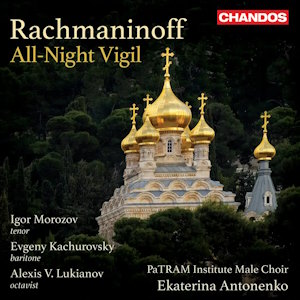
Sergey Rachmaninov (1873-1943)
All-Night Vigil (Vespers), Op. 37 (1915)
Individual hymns arranged for male choir by Benedict Sheehan, Dmitrii Lazarev and Alexander Gretchaninoff
Igor Morozov (tenor); Evgeny Kachurovsky (baritone); Alexis V. Lukianov (octavist)
PaTRAM Institute Male Choir Choir/Ekaterina Antonenko
rec. 2022, Russian Orthodox Convent Monastery Church of the Ascension, Mount of Olives, Jerusalem, Israel
Russian liturgical text in Cyrillic and English translation; notes in English only
Chandos CHSA5349 SACD [70]
This has long been one of my favourite pieces of choral music, so I was intrigued to hear this arrangement for a fifty-strong all-male choir consisting of contra tenors – essentially male altos – tenors, baritones basses and, of course, octavists, with three soloists. It certainly lends a new, darker sonority to this wonderful music, without necessarily usurping my favourite recordings, which are headed by the imperishably beautiful and authentic 1965 recording by Sveshnikov on Melodiya (review). Very few subsequent recordings even begin to touch the transcendence of that vintage recording, but I very much enjoyed the much more recent release from New York on Pentatone (review) and this new version of Rachmaninov’s masterpiece is sung with great reverence and dignity; both the direction and the engineering are impeccable.
It is five minutes slower than Sveshnikov’s and five minutes faster than the Clarion Choir, but that is of no great significance in music which relies primarily upon homogeneity of tone and purity of intonation – and those qualities are present in abundance here. The skilful arrangements are split between Benedict Sheehan and Dmitri Lazarev with the exception of the “Glory to God” (track 7) by Grechaninov/Gretchaninoff, who provided the inspiration and pointed the way to this arrangement. Obviously the music is sometimes recast in lower keys but we may revel in the basses’ same low B-flat at the end of the Kievan Chant and again in the conclusion of “Rejoice O Virgin Theotokos”. A baritone takes the solo originally written for tenor in “Bless the Lord”, which deprives it some of its plangency but he sings beautifully and there is a real frisson to be derived from hearing those octavists thunder out those trenchant low notes. Tenor Igor Morozov is smooth and touchingly supplicatory in his Russian version of the “Nunc dimittis” in that Kievan Chant. I suppose I do sometimes miss the higher voices but the contra tenors/countertenors do add an upper layer in the vocal texture and the grandeur of this performance carries its own conviction.
Ralph Moore
Help us financially by purchasing from



















